Contemporary Southeast Asia: A Journal of International and Strategic Affairs Vol. 18/1 (June 1996)

Date of publication:
June 1996
Number of pages:
117
Code:
CS18/1
Contents
-
Preliminary pages
- ARTICLES
-
The Dynamics of Taiwan's Democratization and Crisis in the Taiwan Strait, by Chang Pao-Min, author see abstractThe March 1996 crisis in the Taiwan Strait was caused essentially by the internal dynamics of Taiwan's unprecedentedly thorough democratization process since the early 1990s, which had not only led to a rapid localization of the political scene, but has also resulted in a new upsurge of Taiwanese consciousness and separatist inclinations. The increasingly fierce competition between the ruling party, the Kuomintang, and its principal challenger, the Democratic Progressive Party, had further compelled the former to emulate the latter's posture and policies, thereby inevitably alarming and antagonizing Beijing. Unless President Lee Teng-hui, during his new term, convinces Beijing that Taiwan's democratization and Taiwanization processes will not lead to political independence, and at the same time also persuade the Taiwanese people that upholding the one-China principle will not necessarily result in reunification, tension might again rise across the Taiwan Strait.
-
Thinking Globally from a Regional Perspective: Chinese, Indonesian, and Malaysian Reflections on the Post-Cold War Era, by Rosemary Foot, author see abstractEast Asian analyses of the global changes that have followed the ending of the Cold War receive less exposure than those emerging from the trans-Atlantic international relations community. This article compares government and academic thinking in China, Indonesia and Malaysia on four key issues: the nature of the post-Cold War global structure; the implications of the emergence of the United States as the sole superpower; the debate over a more activist and democratic United Nations; and attitudes towards global interdependence. It concludes that there are divisions of view and interest among the three states but that at a minimum each displays a sense of disquiet with respect to this new era, with unease at its greatest in Beijing and at its lowest in Jakarta. These differing attitudes could usefully be explored at the various official and unofficial dialogues that have been initiated and which are designed to build confidence and understanding.
-
A Paradigm of Autonomy: The Hong Kong and Macau SARs, by Arnaldo Goncalves, author see abstractThe post-industrial era has witnessed a growing demand for regional autonomy within existing nation-states, side by side with other political independence claims. Autonomous regions within unitary states are perceived by states and the international community at large as subjects of international relations and a repository of their own international personality. Among the countries that host these new trends, the People's Republic of China is attracting world-wide attention with the forthcoming creation of the Hong Kong and Macau Special Administrative Regions (SARs) whose special status is outlined by international covenants and domestic laws. This constitutes a special cocasion to monitor readable examples of autonomy in a sovereignty mega-context. The article outlines a paradigm of autonomy for the Hong Kong and Macau SARs within the framework of Chinas political and constitutional system.
-
ASEAN Dispute Management: Implications for Vietnam and an Expanded ASEAN, by Hoang Anh Tuan, author see abstractAlthough there are various unresolved disputes among the member-states of ASEAN, the organization has succeeded in establishing codes of conduct to manage these disputes so as to promote regional co-operation. These codes of conduct include both written guidelines and unwritten norms. As a new member of ASEAN, Vietnam should learn the rules observed by other ASEAN members in order to manage existing and potential disputes through an "ASEAN way" and thus become fully integrated with the Association. Based on ASEAN's practice of dispute management in recent years, this article seeks to draw some lessons useful to Vietnam. It concludes with a discussion of some challenges both Vietnam and its other ASEAN partners might face in an expanded grouping.
-
The Role of Government in the Utilization of Official Development Assistance in Vietnam, by Pham Hoang Mai, author see abstractVietnam's economic reforms have attracted the attention of the world, including the community of aid donors. Up to now, more than US$6 billion of official development assistance (ODA)has been pledged to support the economic reforms. However, the effective utilization of ODA flows in Vietnam requires the government to intervene actively in the ODA utilization process. Specifically, the government needs to restructure ODA flows, creating counterpart funds to support the government budget and hence mobilize private savings, and disburse more rapidly ODA commitments. On the other hand, the government should restructure the list of priority projects, allocate ODA towards essential socio-economic infrastructure projects and those that directly alleviate poverty.
- BOOK REVIEWS
-
BOOK REVIEW: Asian Flashpoint: Security and the Korean Peninsula edited by Andrew Mack, by Wookhee Shin, author
-
BOOK REVIEW: The Gulf War: Critical Perspectives edited by Michael McKinley, by Keith Krause, author
-
BOOK REVIEW: Asia Pacific: A View on its Role in the New World Order by M S Dobbs-Higginson, by Peter Polomka, author
-
BOOK REVIEW: The Katipunan and the Revolution: Memoirs of a General by Santiago V Alvarez, by Vivencio R Jose, author






